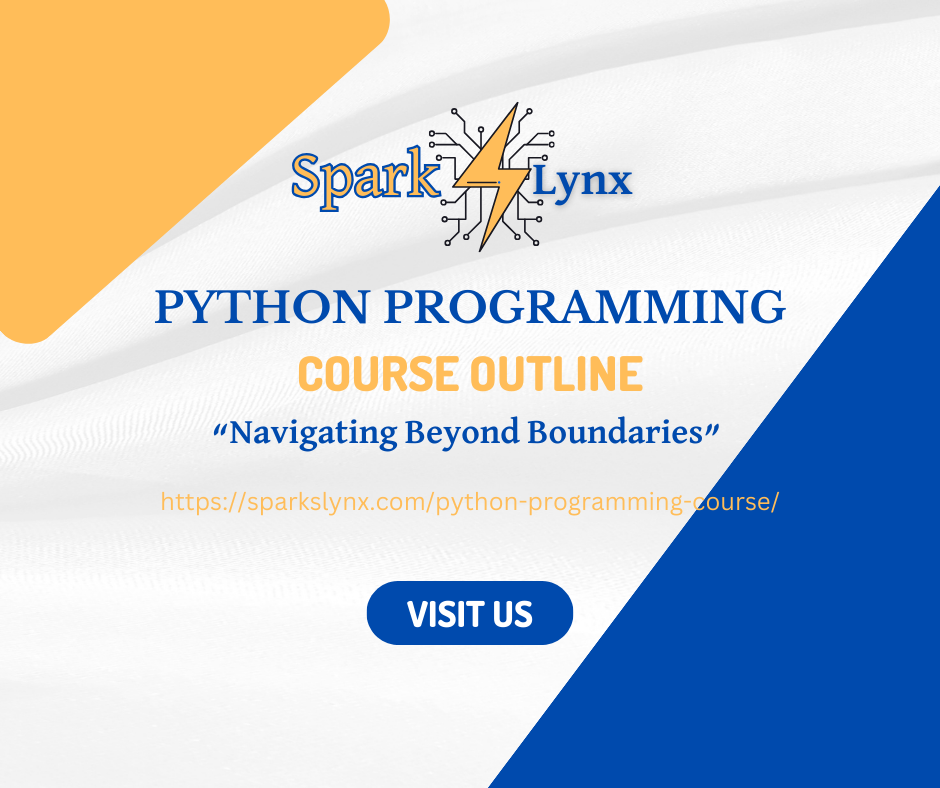Course Overview: This comprehensive Python programming course is designed to equip participants with the skills and knowledge necessary to become proficient Python developers. Throughout the program, students will learn the fundamentals of Python programming, data structures, algorithms, object-oriented programming (OOP), and various libraries and frameworks. By the end of the course, participants will be able to develop robust Python applications for a wide range of purposes.
Week 1-2: Introduction to Python Programming
- Understanding the basics of Python syntax and data types
- Setting up Python development environment (interpreter, IDEs, etc.)
- Writing and executing Python scripts
- Working with variables, operators, and expressions
- Introduction to control flow statements (if, else, loops)
Week 3-4: Data Structures and Algorithms in Python
- Overview of common data structures (lists, tuples, dictionaries, sets, etc.)
- Implementing data structures in Python
- Introduction to algorithm analysis and complexity
- Sorting and searching algorithms (bubble sort, insertion sort, binary search, etc.)
- Recursion and its applications in algorithm design
Week 5-6: Functions and Modules
- Defining and calling functions in Python
- Function parameters and return values
- Scope and lifetime of variables
- Organizing code into modules and packages
- Importing and using modules in Python programs
Week 7-8: Object-Oriented Programming (OOP) in Python
- Understanding the principles of OOP (encapsulation, inheritance, polymorphism)
- Creating classes and objects in Python
- Implementing inheritance and composition
- Method overriding and overloading
- Design patterns and best practices in Python OOP
Week 9-10: File Handling and Exception Handling
- Reading from and writing to files in Python
- Working with different file formats (text files, CSV, JSON, etc.)
- Handling file I/O errors and exceptions
- Introduction to exception handling in Python
- Using try-except blocks and handling multiple exceptions
Week 11-12: Python Standard Library and Built-in Modules
- Exploring the Python standard library
- Working with built-in modules (os, sys, datetime, random, etc.)
- Handling strings, dates, and times in Python
- Performing file and directory operations using os and shutil modules
- Introduction to regular expressions (re module)
Week 13-14: Introduction to Python Libraries
- Overview of popular Python libraries and frameworks
- NumPy for numerical computing and array manipulation
- Pandas for data manipulation and analysis
- Matplotlib and Seaborn for data visualization
- Introduction to data science with Python
Week 15-16: Working with Databases in Python
- Overview of relational databases and SQL
- Connecting to databases using Python (SQLite, MySQL, PostgreSQL, etc.)
- Executing SQL queries from Python programs
- Working with result sets and fetching data
- Database transactions and error handling
Week 17-18: Web Development with Python
- Introduction to web development concepts
- Setting up a web development environment with Python (Flask or Django)
- Handling HTTP requests and responses
- Creating dynamic web applications with templating engines
- Working with databases in web applications
Week 19-20: Introduction to Data Science with Python
- Overview of data science and its applications
- Exploratory data analysis (EDA) using Python libraries (Pandas, Matplotlib, Seaborn)
- Data preprocessing and cleaning techniques
- Introduction to machine learning concepts (classification, regression, clustering)
- Hands-on projects and case studies in data science
Week 21-22: Advanced Python Topics
- Multithreading and multiprocessing in Python
- Asynchronous programming with asyncio
- Python memory management and optimization techniques
- Advanced techniques for working with iterators and generators
- Introduction to functional programming concepts (map, filter, reduce)
Week 23-24: Capstone Project
- Application of Python programming skills to solve a real-world problem or develop a Python application
- Project planning, implementation, and testing
- Presentation of the capstone project to peers and instructors
- Peer review and feedback session
Note: This course outline is subject to adjustments based on the pace of learning and participants’ needs. Practical hands-on exercises, projects, and real-world applications will be emphasized throughout the course to enhance learning and skill development. For More Courses.


Pingback: Online Marketing Services - Digital Marketing - Sparks Lynx